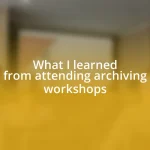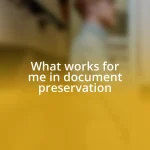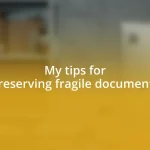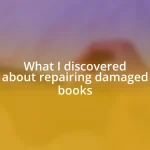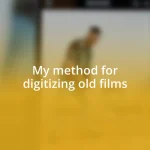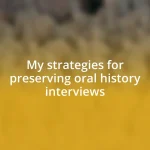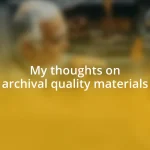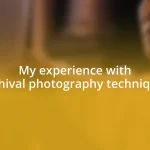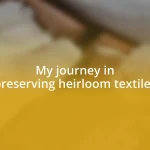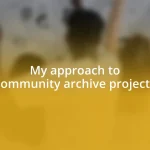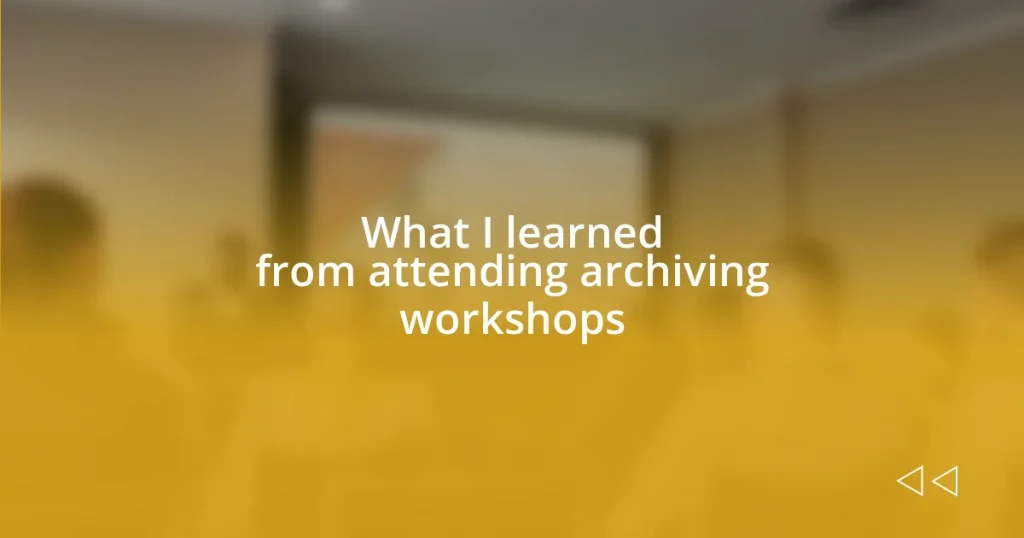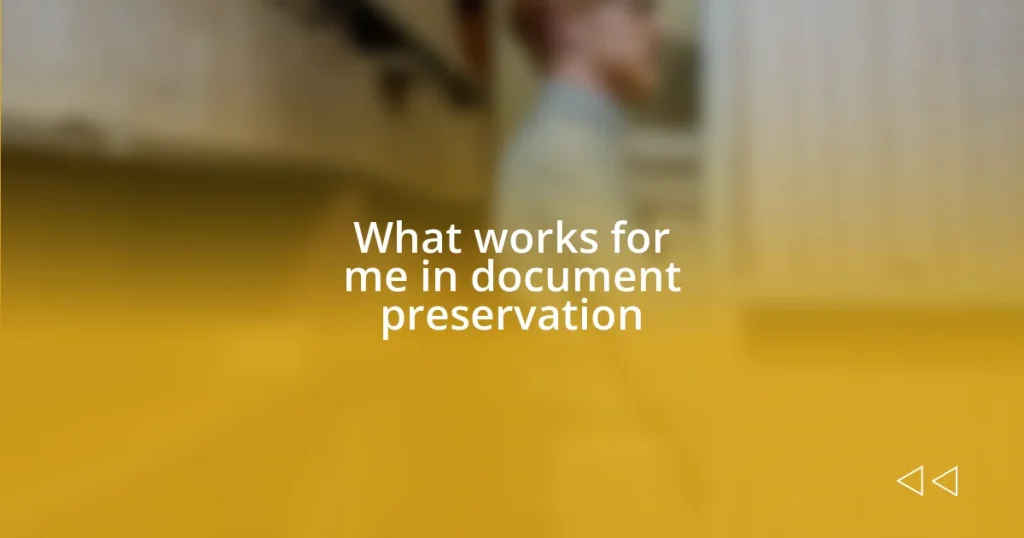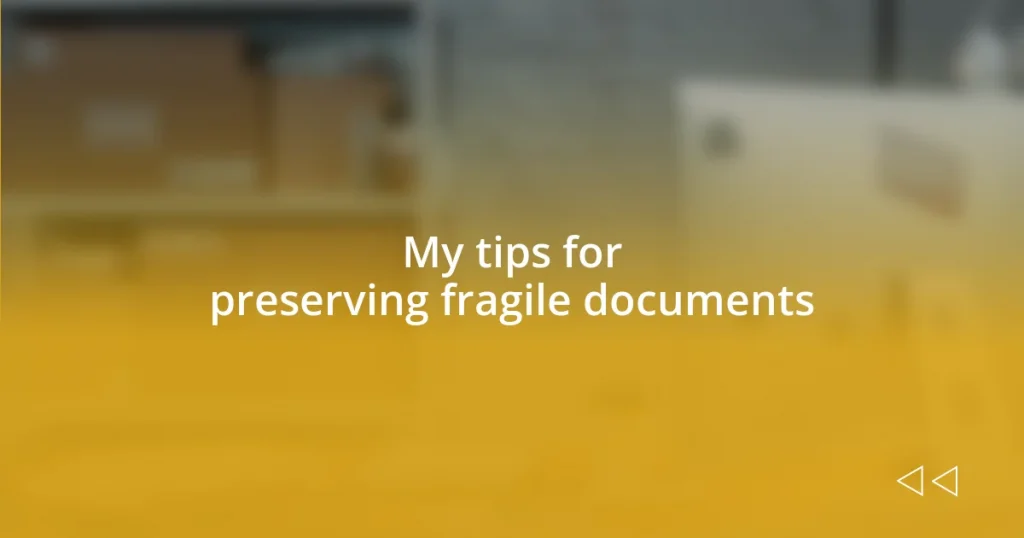Key takeaways:
- Attending archiving workshops fosters a strong sense of community, leading to lasting friendships and professional networks.
- Workshops provide hands-on experience and introduce new technologies, enhancing practical skills such as metadata creation and digital preservation.
- Networking opportunities during workshops can lead to collaborations, mentorship, and community engagement, enriching overall archival practices.
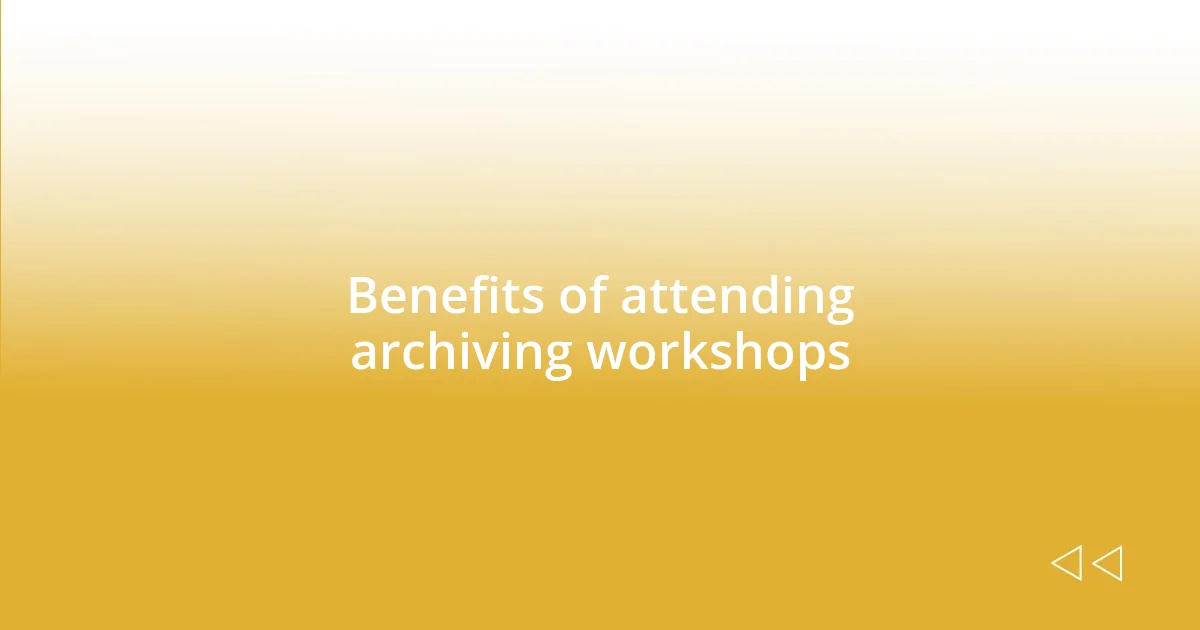
Benefits of attending archiving workshops
One of the most rewarding aspects of attending archiving workshops is the sense of community they foster. I remember stepping into my first workshop and feeling an instant connection with fellow attendees who shared my passion for preserving history. Isn’t it incredible to meet people who understand the value of what you’re trying to protect? These connections often lead to lasting friendships and invaluable professional networks.
Another significant benefit is the hands-on experience that workshops typically provide. During one session, I got to work with rare archival materials, and the thrill of carefully handling these items was unforgettable. It was a unique opportunity to learn best practices in person, which felt far more impactful than reading about them in a book. How often do we get to learn directly from experienced professionals while engaging with real artifacts?
I also found that these workshops often highlight the latest technologies and methodologies in archiving. I vividly recall a demonstration on digital preservation methods that completely transformed my approach to my own projects. Have you ever felt overwhelmed by the pace of technological change? Attending these workshops equipped me with practical tools and insights that made adapting to changes much easier and less daunting.
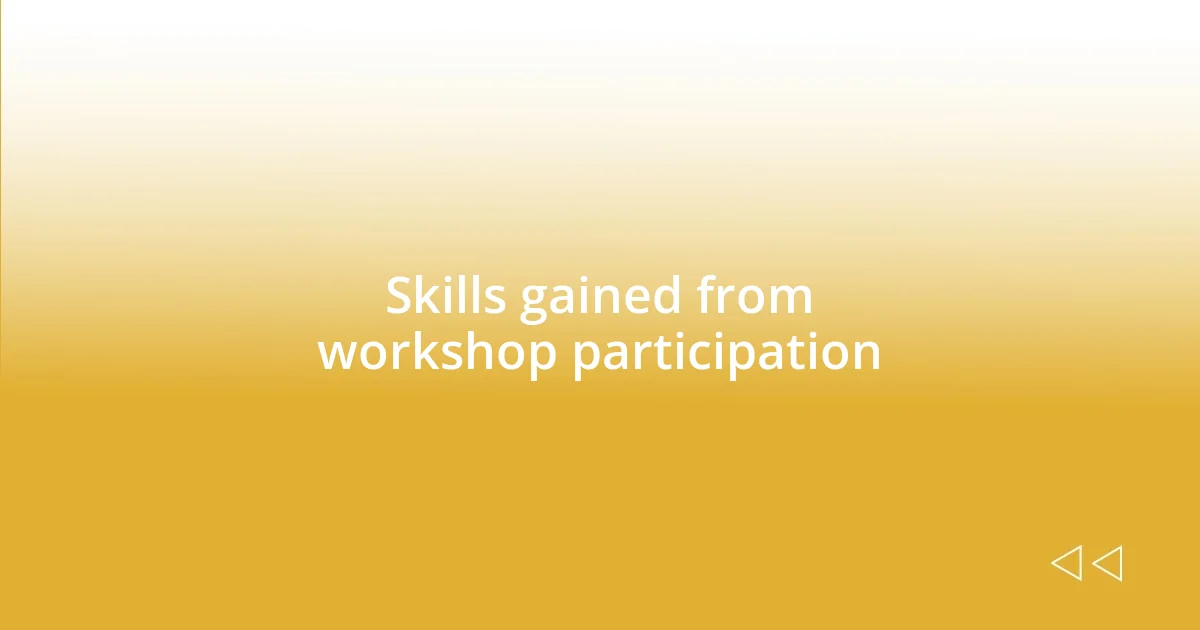
Skills gained from workshop participation
Participating in archiving workshops has equipped me with a plethora of practical skills that I never expected to gain. One memorable experience was when I learned about metadata creation. It initially sounded like a daunting concept, but through hands-on exercises, I realized how vital accurate metadata is in making collections accessible. It felt empowering to walk away knowing I could enhance the discoverability of archival materials.
Here are some key skills that I developed from these workshops:
– Metadata proficiency: Understanding and creating meaningful metadata.
– Digital preservation techniques: Gaining insight into processes that protect digital records.
– Archival arrangement and description: Learning how to organize collections systematically.
– Utilization of archiving software: Familiarity with tools that streamline archiving tasks.
– Networking skills: Building connections with both peers and experts, fostering future collaborations.
– Hands-on conservation techniques: Practical skills in preserving physical items safely.
Each experience I had not only refined my technical abilities but also deepened my appreciation for the field, allowing me to connect more authentically with the materials I work with.
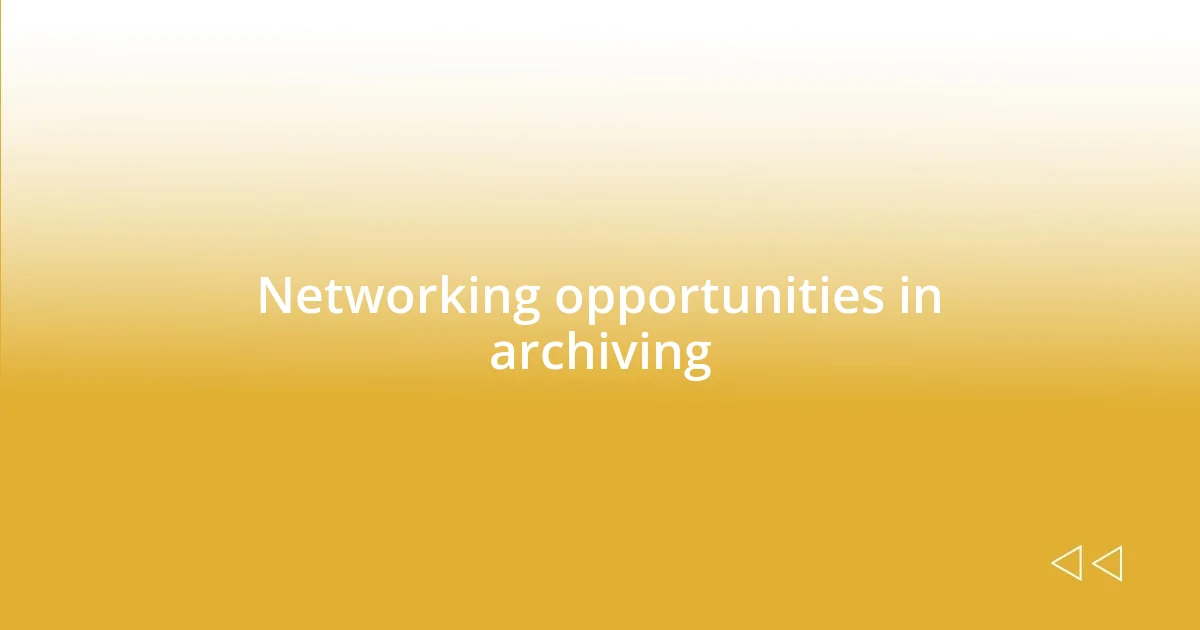
Networking opportunities in archiving
The networking opportunities in archiving workshops are truly remarkable. I remember one particular event where I struck up a conversation with a seasoned archivist over coffee. We found common ground in our passion for community archiving initiatives, and just like that, I was invited to collaborate on a project that helped preserve local history. This was a game-changer for me; I quickly learned that these informal connections can lead to collaborative projects, mentorship, and shared resources that can enhance your professional journey.
It’s fascinating how workshops bring together people from diverse backgrounds. One evening, I participated in a group discussion that included archivists from museums, libraries, and private collections. Everyone had different experiences and insights to share. I walked away with not only new contacts but invaluable perspectives that broadened my understanding of the field. Engaging with people who have unique stories and approaches can significantly shape how we navigate our careers in archiving.
In my experience, networking doesn’t always happen in structured settings. A chance encounter during a workshop lunch turned into a discussion that lasted for hours. I ended up learning about innovative strategies for digital archiving that I hadn’t considered before. These spontaneous interactions often turn into the most rewarding connections. Isn’t it amazing how one conversation can spark inspiration or lead to a future collaboration?
| Opportunity | Description |
|---|---|
| Collaboration | Working with peers on joint projects. |
| Mentorship | Forming invaluable relationships with experienced archivists. |
| Resource sharing | Exchanging tools and techniques to enhance workflows. |
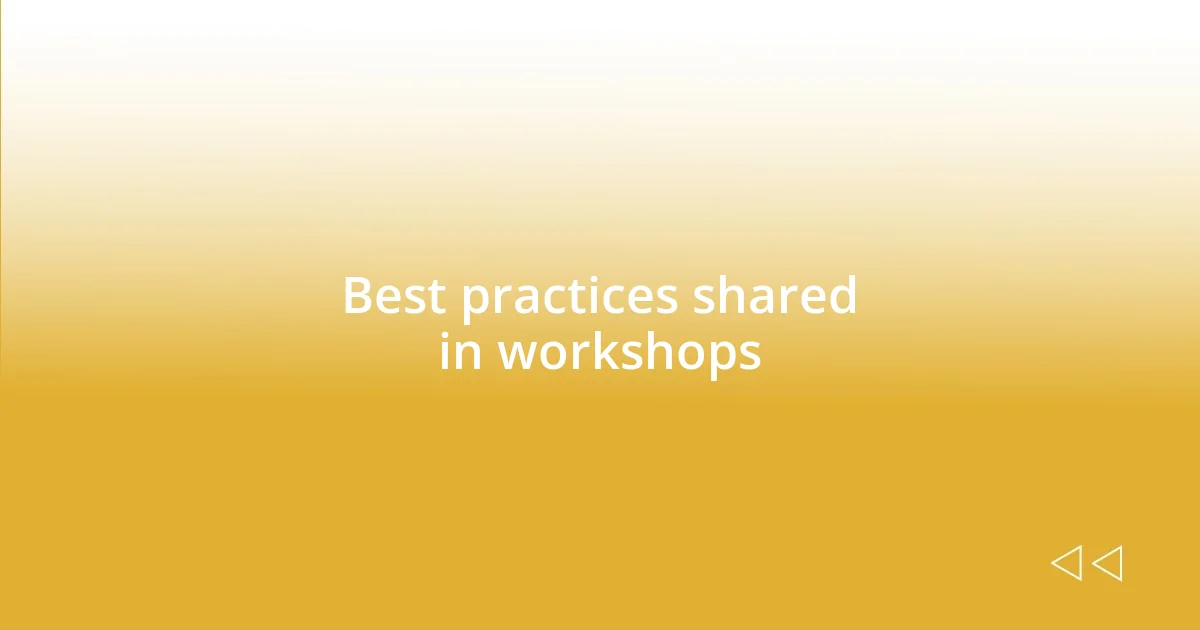
Best practices shared in workshops
One best practice I encountered was the importance of developing a consistent workflow for digitizing materials. During one workshop, we were divided into groups and challenged to create a streamlined plan for digitization. It was eye-opening to hear how different archivists approach the same task in unique ways. I realized that having a well-documented process not only speeds up the work but also ensures that vital steps aren’t overlooked. Have you ever found yourself in a chaotic workflow? Standardizing procedures makes a real difference.
Another valuable insight was the emphasis on community engagement. I vividly remember a discussion led by an expert who shared her success in connecting with local schools to demystify archiving. Her methods transformed our perspective; we saw the need to make archiving relatable. It struck me then that outreach isn’t just beneficial for the community—it’s also an opportunity for archivists to learn from varied perspectives and enrich our collections. Engaging with the community can breathe new life into our projects. How often do we actively seek feedback or collaboration outside our bubble?
Hands-on experience with conservation techniques also stood out to me. In one practical session, we learned to repair books using archival-safe materials. I can still feel the sense of accomplishment as I carefully mended a cover; it was rewarding to know I was preserving a piece of history. The session underscored that taking the time to learn preservation skills can significantly extend the life of our collections. Do we fully appreciate the art of caring for our materials? It’s not just a task; it’s a commitment to safeguarding the past for future generations.
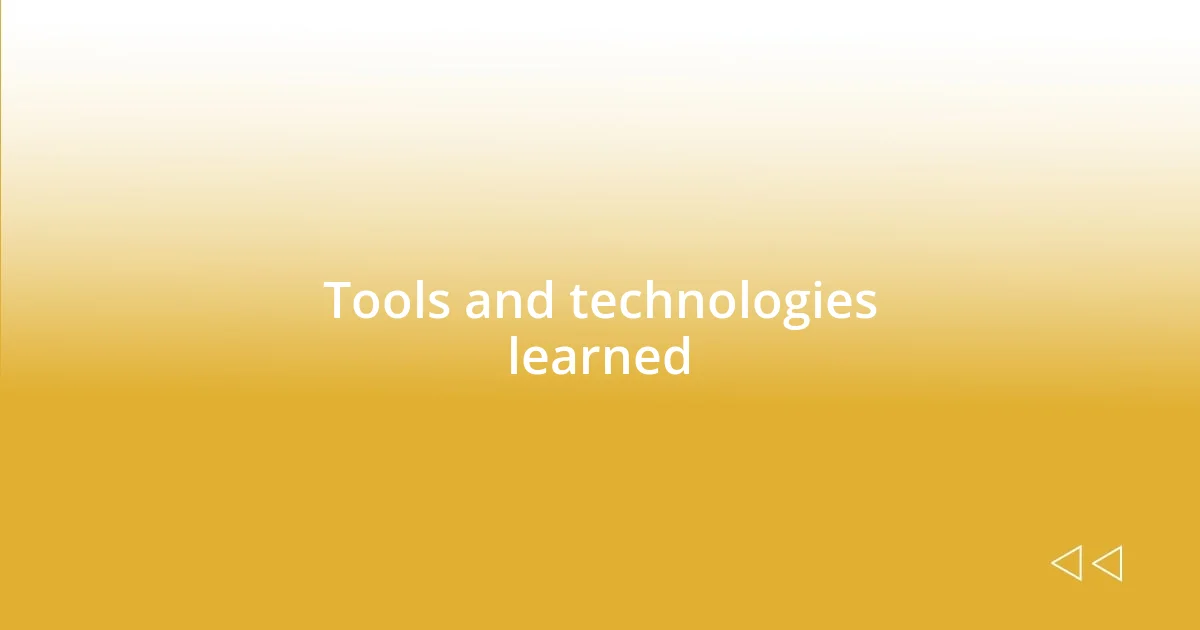
Tools and technologies learned
In my journey through various archiving workshops, I was introduced to an array of cutting-edge tools that transformed my workflow. One particular session focused on metadata creation tools, which sparked a revelation for me. Before attending, I often struggled with organizing and retrieving information effectively. Learning about software like Omeka opened my eyes to how proper metadata tagging can make archives more accessible. It’s almost like giving your materials a roadmap—have you ever tried navigating without directions?
One of the most exciting technologies I encountered was the use of digital preservation systems. During a hands-on demo, we got to explore how these systems can automate workflows and ensure long-term access to digital assets. I remember sitting there, realizing how much time I would save while also increasing the integrity of my collections. Learning to implement solutions like Preservica helped me understand that technology is more than just a convenience; it’s a critical ally in safeguarding our cultural heritage.
In another workshop, we delved into the world of collaborative tools that enhance teamwork. I was particularly struck by the interactive project management software. The moment I realized that we could coordinate tasks and share files in real-time, I thought about how this could revolutionize my projects. Have you ever experienced the chaos of email threads and missed messages? Using tools like Trello made me appreciate the clarity and organization achievable through technology. It was a game-changer, allowing me to focus on the content rather than the coordination.
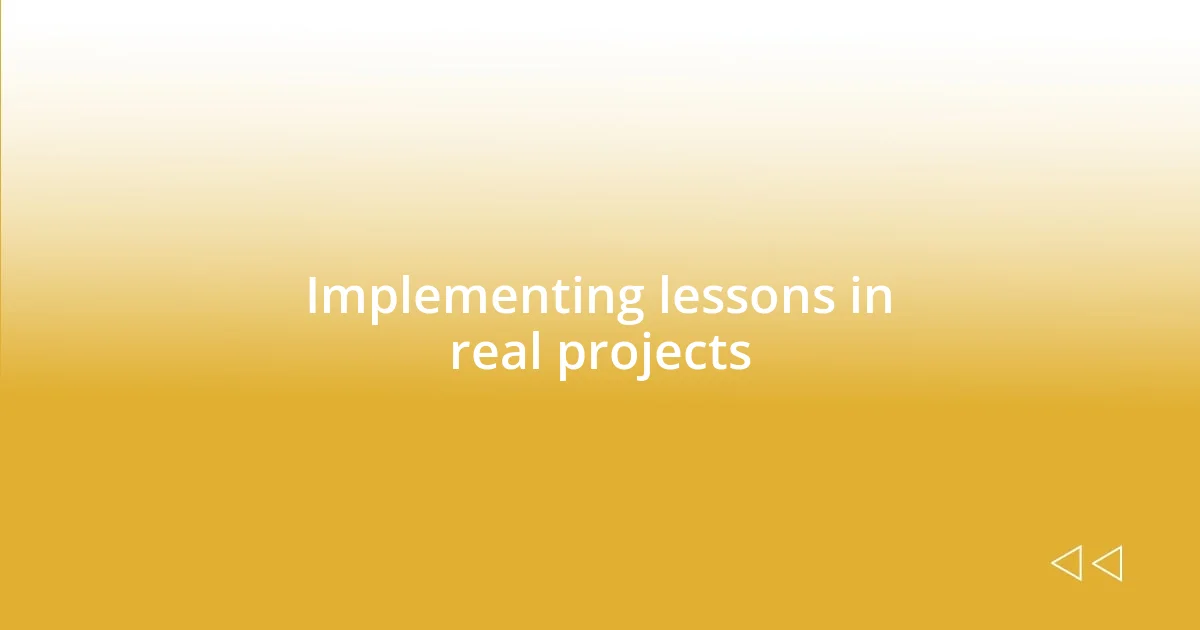
Implementing lessons in real projects
When it comes to implementing lessons from the workshops in real projects, I recall a project where I applied my newfound understanding of consistency in workflows. It was a small but essential archiving effort, sorting through a collection of family letters. I carefully crafted a straightforward process for digitizing and cataloging, inspired by the group exercises we did. The simplicity of having each step outlined allowed me to stay focused and avoid the feelings of disharmony that often emerge in messy projects—ever felt the pressure of disorganization creeping in?
I also harnessed the power of community engagement in a recent collaboration with a local historical society. Borrowing from the workshop discussions, I organized an open house where community members could share their own stories and artifacts. The energy in the room was palpable! Not only did it ignite excitement about our collections, but the dialogue also inspired me to re-examine materials I had previously overlooked. Engaging others in the process reinforced the idea that archiving isn’t a solitary endeavor; it thrives on shared narratives and connections. How often do we think to invite outside voices into our work?
Moreover, I took the plunge and invested in a digital preservation system after witnessing its potential in a workshop demo. I remember grappling with anxiety when faced with the vast amount of digital files from past projects. The fear of losing invaluable data loomed over me. However, after learning how these systems can automate many processes, I felt an exhilarating wave of relief. Implementing solutions like this not only curtailed my worry but also paved the way for more streamlined access to important records. Have you ever felt the weight of preservation resting solely on your shoulders? By embracing technology, I found a supportive framework that empowers my archival efforts.
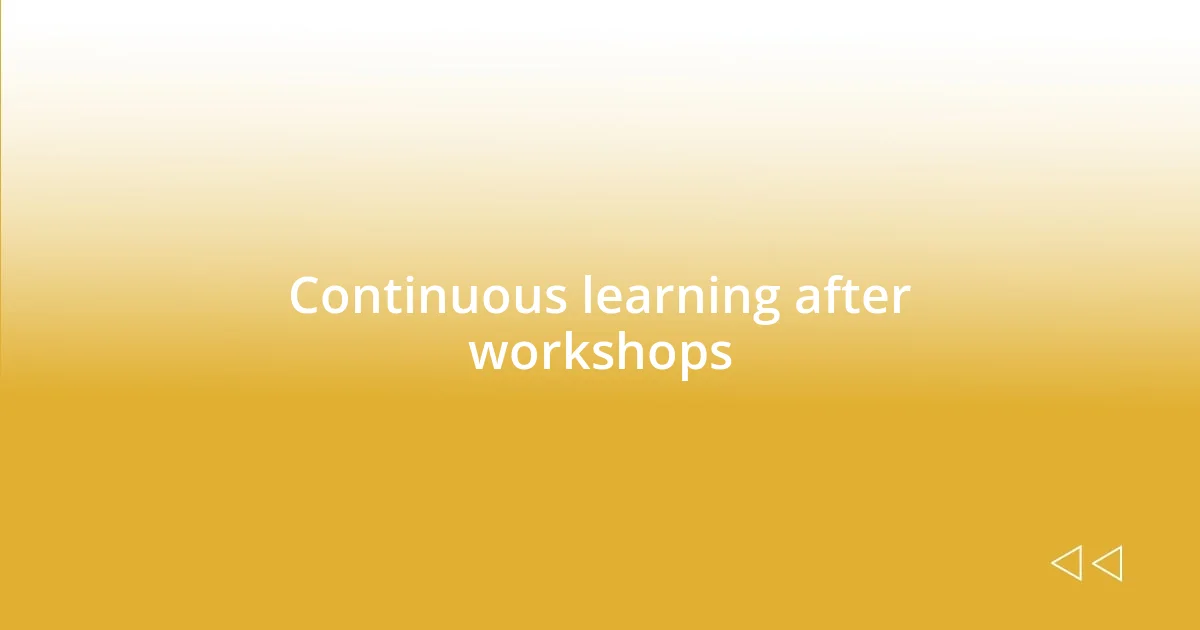
Continuous learning after workshops
Continuing my learning journey after the workshops has been both exciting and transformative. One day, I grabbed my notebook and reflected on a workshop focusing on community archiving efforts. I started small by reaching out to friends and family, asking if they had any old photos or documents they wanted to share. The joy and sentimentality that surfaced from those simple conversations made me realize that archiving isn’t just about preservation; it’s about connecting with stories that matter. Can you remember the last time you uncovered a treasure from someone’s past?
As I immersed myself in these discussions, I stumbled upon new strategies to attract volunteers for archiving projects. Inspired by the collaborative spirit in the workshops, I developed a plan for regular meetups to discuss our findings and share experiences. When I saw the enthusiasm in the faces of volunteers as they contributed their stories, it reaffirmed the idea that every viewpoint adds value. Have you ever found a community that sparks such passion in your work?
Lastly, I’ve taken to heart the importance of staying updated with best practices. After attending a session on the latest trends in digital archiving, I developed a habit of subscribing to relevant newsletters and joining online forums. These resources have kept me informed and motivated, providing insights I might have otherwise missed. Sometimes, it’s easy to feel overwhelmed by the volume of information out there, but every new piece I learn adds another layer to my understanding. Isn’t it thrilling to discover how much there is still to explore?
